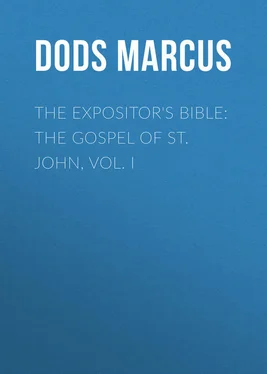Marcus Dods - The Expositor's Bible - The Gospel of St. John, Vol. I
Здесь есть возможность читать онлайн «Marcus Dods - The Expositor's Bible - The Gospel of St. John, Vol. I» — ознакомительный отрывок электронной книги совершенно бесплатно, а после прочтения отрывка купить полную версию. В некоторых случаях можно слушать аудио, скачать через торрент в формате fb2 и присутствует краткое содержание. Издательство: Иностранный паблик, Жанр: foreign_religion, foreign_antique, foreign_prose, на английском языке. Описание произведения, (предисловие) а так же отзывы посетителей доступны на портале библиотеки ЛибКат.
- Название:The Expositor's Bible: The Gospel of St. John, Vol. I
- Автор:
- Издательство:Иностранный паблик
- Жанр:
- Год:неизвестен
- ISBN:нет данных
- Рейтинг книги:4 / 5. Голосов: 1
-
Избранное:Добавить в избранное
- Отзывы:
-
Ваша оценка:
- 80
- 1
- 2
- 3
- 4
- 5
The Expositor's Bible: The Gospel of St. John, Vol. I: краткое содержание, описание и аннотация
Предлагаем к чтению аннотацию, описание, краткое содержание или предисловие (зависит от того, что написал сам автор книги «The Expositor's Bible: The Gospel of St. John, Vol. I»). Если вы не нашли необходимую информацию о книге — напишите в комментариях, мы постараемся отыскать её.
The Expositor's Bible: The Gospel of St. John, Vol. I — читать онлайн ознакомительный отрывок
Ниже представлен текст книги, разбитый по страницам. Система сохранения места последней прочитанной страницы, позволяет с удобством читать онлайн бесплатно книгу «The Expositor's Bible: The Gospel of St. John, Vol. I», без необходимости каждый раз заново искать на чём Вы остановились. Поставьте закладку, и сможете в любой момент перейти на страницу, на которой закончили чтение.
Интервал:
Закладка:
In this brief introduction to his Gospel John summarises its contents, and presents an abstract of the history he is about to relate in detail. That the Eternal Word, in whom was the life of all things, became flesh and was manifested among men; that some ignored while others recognised Him, that some received while others rejected Him, – this is what John desires to exhibit at large in his Gospel, and this is what he summarily states in this compact and pregnant introductory passage. He briefly describes a Being whom he names “The Word;” he explains the connection of this Being with God and with created things; he tells how He came to the world and dwelt among men, and he remarks upon the reception He met with. What is summed up in these propositions is unfolded in the Gospel. It narrates in detail the history of the manifestation of the Incarnate Word, and of the faith and unbelief which this manifestation evoked.
John at once introduces us to a Being whom he speaks of as “The Word.” He uses the term without apology, as if already it were familiar to his readers; and yet he adds a brief description of it, as if possibly they might attach to it ideas incompatible with his own. He uses it without apology, because in point of fact it already had circulation both among Greek and Jewish thinkers. In the Old Testament we meet with a Being called “The Angel of the Lord,” who is at once closely related, if not equivalent, to Jehovah, and at the same time manifested to men. Thus when the Angel of the Lord had appeared to Jacob and wrestled with him, Jacob called the name of the place Peniel, for, said he, “I have seen God face to face.” 1 1 See also Gen. xvi. 13, xviii. 22; Exod. iii. 6, xxiii. 20; Judges xiii. 22.
In the apocryphal books of the Old Testament the Wisdom and the Word of God are poetically personified, and occupy the same relation to God on the one hand, and to man on the other, which was filled by the Angel of the Lord. And in the time of Christ “the Word of the Lord” had become the current designation by which Jewish teachers denoted the manifested Jehovah. In explaining the Scriptures, to make them more intelligible to the people, it was customary to substitute for the name of the infinitely exalted Jehovah the name of Jehovah’s manifestation, “the Word of the Lord.”
Beyond Jewish circles of thought the expression would also be readily understood. For not among the Jews only, but everywhere, men have keenly felt the difficulty of arriving at any certain and definite knowledge of the Eternal One. The most rudimentary definition of God, by declaring Him to be a Spirit, at once and for ever dissipates the hope that we can ever see Him, as we see one another, with the bodily eye. This depresses and disturbs the soul. Other objects which invite our thought and feeling we easily apprehend, and our intercourse with them is level to our faculties. It is, indeed, the unseen and intangible spirit of our friends which we value, not the outward appearance. But we scarcely separate the two; and as we reach and know and enjoy our friends through the bodily features with which we are familiar, and the words that strike upon our ear, we instinctively long for intercourse with God and knowledge of Him as familiar and convincing. We put out our hand, but we cannot touch Him. Nowhere in this world can we see Him more than we see Him here and now. If we pass to other worlds, there, too, He is concealed from our sight, inhabiting no body, occupying no place. Job is not alone in his painful and baffling search after God. Thousands continually cry with him, “Behold, I go forward, but He is not there; and backward, but I cannot perceive Him: on the left hand, where He doth work, but I cannot behold Him: He hideth Himself on the right hand, that I cannot see Him.”
In various ways, accordingly, men have striven to alleviate the difficulty of mentally apprehending an invisible, infinite, incomprehensible God. One theory, struck out by the pressure of the difficulty, and frequently advanced, was not altogether incompatible with the ideas suggested by John in this prologue. This theory was accustomed, although with no great definiteness or security, to bridge the chasm between the Eternal God and His works in time by interposing some middle being or beings which might mediate between the known and the unknown. This link between God and His creatures, which deemed to make God and His relation to material things more intelligible, was sometimes spoken of as “The Word of God.” This seemed an appropriate name by which to designate that through which God made Himself known, and by which He came into relations with things and persons not Himself. Vague indeed was the conception formed even of this intermediary Being. But of this term “the Word,” and of the ideas that centred in it, John took advantage to proclaim Him who is the manifestation of the Eternal, the Image of the Invisible. 2 2 For the need of intermediaries, see Plato, Symposium , pp. 202–3: “God mingles not with men; but there are spiritual powers which interpret and convey to God the prayers and sacrifices of men, and to men the commands and rewards of God. These powers span the chasm which divides them, and these spirits or intermediate powers are many and divine.” See also Philo ( Quod Deus Immut. , xiii.): “God is not comprehensible by the intellect. We know, indeed, that He is, but beyond the fact of His existence we know nothing.” The Word reveals God; see Philo ( De post. Caini , vi.) “The wise man, longing to apprehend God, and travelling along the path of wisdom and knowledge, first of all meets with the Divine words, and with them abides as a guest.”
The title itself is full of significance. The word of a man is that by which he utters himself, by which he puts himself in communication with other persons and deals with them. By his word he makes his thought and feeling known, and by his word he issues commands and gives effect to his will. His word is distinct from his thought, and yet cannot exist separate from it. Proceeding from the thought and will, from that which is inmost in us and most ourselves, it carries upon itself the imprint of the character and purpose of him who utters it. It is the organ of intelligence and will. It is not mere noise, it is sound instinct with mind, and articulated by intelligent purpose. By a man’s word you could perfectly know him, even though you were blind and could never see him. Sight or touch could give you but little fuller information regarding his character if you had listened to his word. His word is his character in expression.
Читать дальшеИнтервал:
Закладка:
Похожие книги на «The Expositor's Bible: The Gospel of St. John, Vol. I»
Представляем Вашему вниманию похожие книги на «The Expositor's Bible: The Gospel of St. John, Vol. I» списком для выбора. Мы отобрали схожую по названию и смыслу литературу в надежде предоставить читателям больше вариантов отыскать новые, интересные, ещё непрочитанные произведения.
Обсуждение, отзывы о книге «The Expositor's Bible: The Gospel of St. John, Vol. I» и просто собственные мнения читателей. Оставьте ваши комментарии, напишите, что Вы думаете о произведении, его смысле или главных героях. Укажите что конкретно понравилось, а что нет, и почему Вы так считаете.












